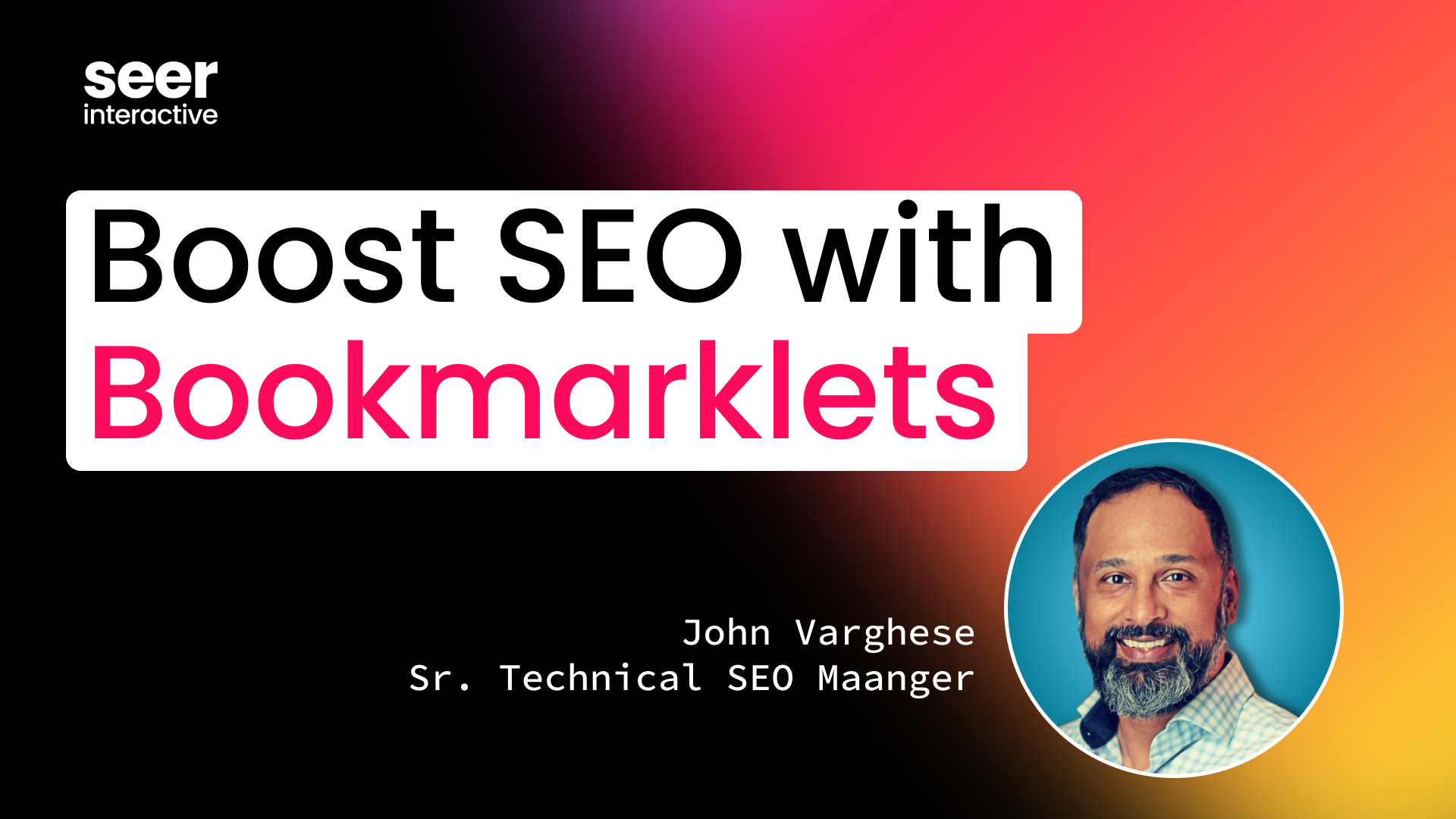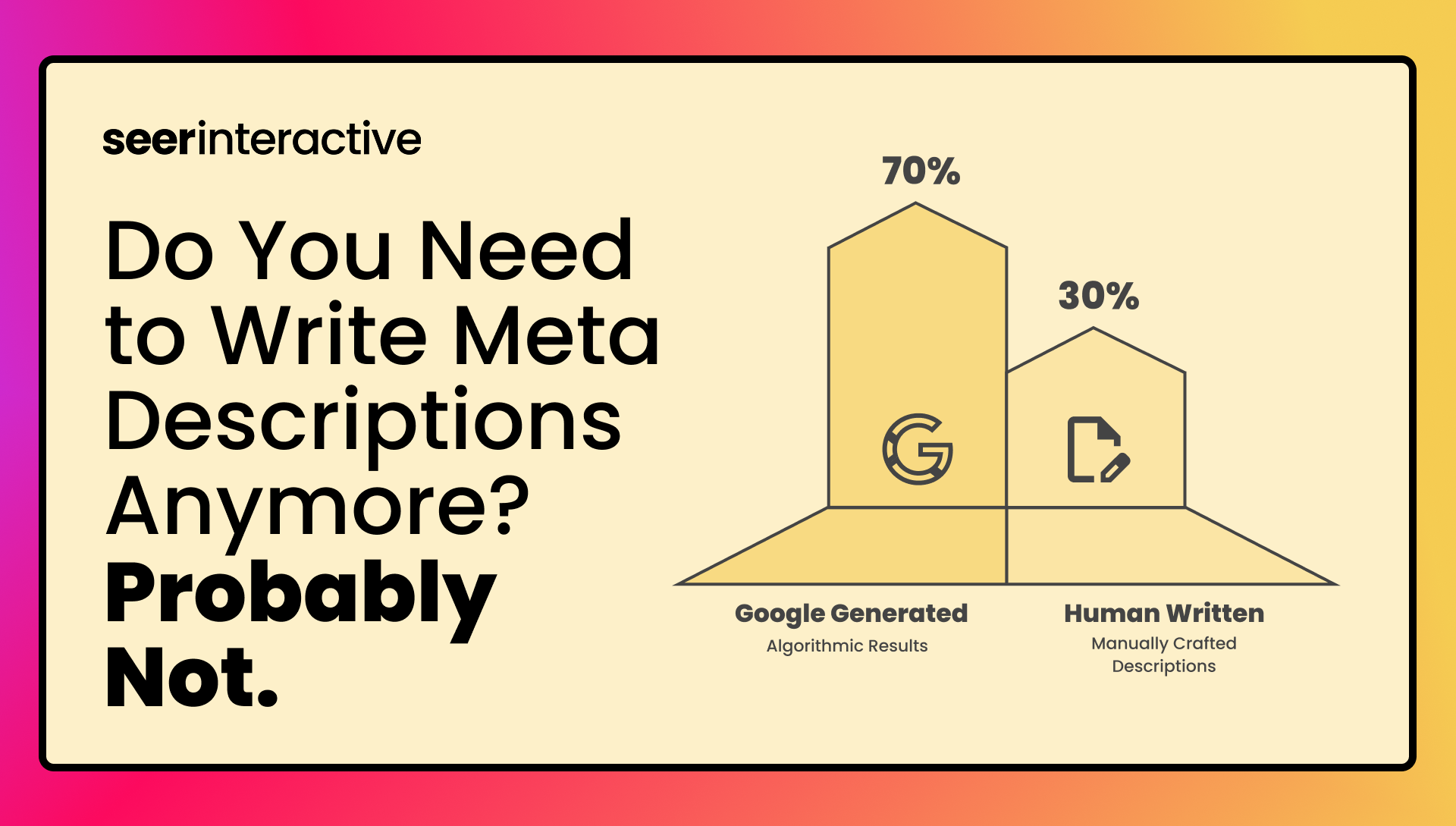Google is doubling down on AI with SGE
We talk a lot about using AI as a tool and how it can make not only our day-to-day lives easier, but our target audience’s lives easier too. The goal of AI, not unlike search in general, is to help remove friction between a user and the problem they're trying to solve.
In a lot of ways, it seems like the use of AI tools like Chat GPT and Bard could replace traditional search.
We all have opinions on where the chips will fall, but search engines like Google are making a significant bet that search will exist in the future by integrating AI directly into search results.
During the Google IO Conference in May, Google announced their plan to bring generative AI into Google search results. Google refers to this as Search Generative Experience (SGE).
Since then, this new feature has been accessible to individuals who are part of Search Labs. Google hasn’t released numbers of how many people are currently using SGE, but that number is likely growing as more folks move off the waitlist. As of today, only personal emails can participate. Companies leveraging Google Workspace for business don't have access at those email addresses.
Access to SGE is crucial to get as a search marketer today, to have time to play around with SGE and start to understand what influences it ahead of the full rollout.
[TIP] Generative AI in search is a huge opportunity for digital marketing nerds to sink their teeth into this new feature.
If you’re not on that waitlist and you’re a marketer, you should sign up today.
What Does the Search Generative Experience Look Like in Google Search?
I was recently moved off the waitlist and into the world of SGE. At a high level, it doesn’t have the same capabilities of Bard or Chat GPT, but it will disrupt the way people find answers.
Google is testing the SGE feature and there is still a lot of work to be done. But with early testers providing feedback, SGE will be rolled out to the public before we know it.
What makes this particularly disruptive is Google users will be using Generative AI automatically, rather than needing to actively sign up for a Chat GPT or Bard.
SGE Seamless Integration in Google Search
Generative AI in search is really easy to use. Similar to other search engines (like Bing, who released AI features in search), the interface of Google’s search engine hasn’t changed drastically.
People will still be greeted by the Google.com homepage they’re used to seeing and trusting.

The biggest change is when they hit enter and see the Google Search Result.
This generative result takes up the majority of above the fold real estate. It is followed by the search result we’re used to, organic links and search features.

What's the difference between SGE and Answer Boxes?
The biggest difference between the SERP answer boxes we’re used to and the generative result is that the generative result pulls from multiple sources instead of only one.
Answer boxes and SGE do provide the same type of information in the SERP. So monitoring how reliant your business is on zero-click SERP features like knowledge graphs and 'People Also Asks" will help you better undrestand what your AI-disruption of search traffic risk may be.
Will SGE change how users query?
What search queries look like is going to vary person-to-person. People likely won’t change their behavior with the types of queries they type in [at first].
After all, we’ve been using Google pretty much the same way since 1998 and it will be a big shift in behavior to go from searching “things to do in X” to having a conversation with Google Search like it’s a travel agent.
However, as people start to understand the power of the tool, we do believe longer tail queries are likely going to become the norm.
What We Think Early State User Queries Will Look Like:
- Search query: things to do in erie pa in July

What We Think Intermediate State User Queries Will Look Like:
- Search query: things to do in erie pa in July for a couple and their dog

What We Think Long-Term State User Queries Will Look Like:
People will be searching for very long tail keywords. Example: My partner and I really like breweries, hiking, and kayaking, we have three days to visit erie what should we do
Today, SGE isn’t able to give me a full itinerary. 
However, looking at the present capabilities of Bard, it isn’t too far-fetched to believe that this will be possible one day in search.

[Source: Bard]
New Ways to Refine Searches with SGE
The generative results feature multiple options to encourage searchers to engage with its conversion feature. This includes:
- Frequently asked questions that allow searchers to dig in deeper about a specific topic (sound a little bit like People Also Ask results?).
- An option to ask a custom follow up question
- An option to “converse”

Clicking any of these options will enter you into a chat - sort of. You’re moved to another search results page with a new answer followed by additional organic links for your consideration.

This feature is great for keeping a history of your searches and links for you to refer back to. The converse feature does not have the same conversational capabilities of Bard or Chat GPT, and does best answering conditional statements or the specific questions prompted by Google.
Google is Sourcing Answers from Multiple Sources Instead of One
We know that Google is leveraging its index, knowledge graphs, and user feedback to inform what is displayed in SGE. Instead of using one or two sources for each featured snippet (Answer Boxes, People Also Ask Questions, Knowledge Graphs, etc.), Google is leveraging more of its library and its understanding of that library to provide a more robust answer to a searcher’s query directly in the search engine result page.
- For Travel:
- Reviews
- Photos
- Business Profiles
- For Ecommerce:
- Google’s Shopping Graph
[TIP] If you’re in either of these industries, it’s a great time to make sure you have your ducks in a row across these sources
What this looks like in action:
- Search query: zahav philadelphia

- Date Founded: https://www.zahavrestaurant.com/chef.html (the only page 2008 is mentioned)
- Phone Number: Website, Google Business Profile, or Visit Philly
- Known for Hummus: Approximately 10% of reviews mention hummus (218/2,417). “Hummus” is the highest-mentioned ngram in Google reviews for this restaurant. (And who could blame them? It is delicious).

- Best Restaurant In America: Eat Travel Drink
- 4:30 Arrival time: Eat Travel Drink

[Source: Eat Travel Drink]
At minimum, the SGE answer box pulled from 4 different sources to satisfy this query.
SGE Isn’t Consistent Across Industries
Industries that fall under “Your Money. Your Life” (YMYL) categories, likely won’t see SGE for a while. YMYL content is under more strict quality guidelines than non-YMYL content. YMYL topics can directly and significantly impact people’s health, financial stability or safety, or the welfare or well-being of society - and any misinformation that is provided could cause harm.
YMYL topics include (but are not limited to):
- Health or Safety: Topics that could harm mental, physical, and emotional health, or any form of safety such as physical safety or safety online.
- Financial Security: Topics that could damage a persons’ ability to support themselves and their families.
- Society: Topics that could negatively impact groups of people, issues of public interest, trust in public institutions, etc.
[Source: Search Quality Evaluator Guidelines, 2022]
So far, Google will not answer questions with SGE that could directly influence a person’s decision related to their finances or society. However, it will answer questions that can inform someone’s decision. When it does so, it does so with caveats.
I tested a handful of queries to see what Google would and would not answer with SGE.
|
YMYL TOPIC |
SEARCH QUERY TESTED |
SGE PRESENT? |
NUANCES |
|
Finance - Investment |
i have $50 to invest |
No |
N/A |
|
Finance - Bank Accounts |
best bank accounts to open |
No |
N/A |
|
Finance - Credit Cards |
credit card for bad credit no deposit |
No |
N/A |
|
Finance - General Education |
difference between capital one and discover |
Yes |
Caveat in SGE: “This is not professional financial advice. Consulting a financial advisor about your particular circumstances is best.” |
|
Health/Safety - When to see a doctor |
when to see a doctor for poison ivy |
Yes |
Caveat in SGE: “This is for informational purposes only. This information does not constitute medical advice or diagnosis.” |
|
Health/Safety - Where to go for medical care |
should i go to the hospital or urgent care for pneumonia |
Yes |
Caveat in SGE: “This is for informational purposes only. This information does not constitute medical advice or diagnosis.” |
|
Health/Safety - Insurance options |
best health insurance for self employed |
No |
N/A |
|
Society - Voting |
who should i vote for pa |
No |
N/A |
|
Society - Voting Education |
who is running for judge of the superior court |
Yes |
No Caveat |
|
Society - Taxes |
what are taxes used for |
No |
N/A |
All results still included the option to “converse” with Google, even when SGE wasn’t present. For non-SGE results, clicking “converse,” only displays typical results and there is no sign of SGE.

Even though there may be a handful of topics that we won’t see SGE for, SGE appears more often than not when using Google (if you're enrolled in Search Labs).
Is SGE Accurate?

Google and other AI developers know that their AI products aren’t going to nail it 100% of the time. In the result above we can see a mismatch in information between the SGE and the answer box featured. However, as time progresses, this technology is only going to get better.
If you see inaccurate information, you have the option to provide it directly to Google (as you have historically been able to do with the answer boxes we know today).
What Does this Mean for Search Marketers?
This is one of many AI updates that are shaking up the way that people look for answers. Similar to other tools, the shift to these AI experiences vs traditional searches are going to be reserved to early adopters for now.
That being said, unlike tools like Chat GPT and Bard where people have to actively go and investigate the tools, SGE is going to be front and center of every one of Google’s billions of users once it’s fully rolled out.
Don’t Panic
This isn’t the first time we’ve seen Google pushing for users to find the answers they need directly on the search engine result page rather than clicking through. Google’s vision statement, afterall, is "to provide access to the world's information in one click".
We survived the initial roll out of answer boxes by adapting our marketing strategies, and we can do the same now. This is a change we should embrace.
New Opportunities
Instead of answer boxes allowing users to click through to one site, there’s an opportunity for prime search real estate for multiple sites.
Preparing for Change
Change is coming. To start preparing yourself, here are 6 things you can do to actively prepare for SGE rolling out.
- Monitor your click-through-rate: One of the first things to change will likely be click-through-rates. As SGE rolls out to more users, the click-through-rate of the ten organic links (even position 1) may lower. You can monitor your click-through-rate in Google Search Console.
- Stay on top of product updates: Google announcements of continued roll outs and what’s feeding the SGE results. You can get these updates directly sent to your inbox by signing up for weekly news and stories from Google.
- Think about your online reputation management strategy. SGE can source information across Google’s index - ensuring that the narrative about your brand is accurate will mean you need to own the brand narrative.
- Ensure your owned properties are accurate and up to date: This includes your website, shopping listings, and Google business profiles.
- Play around with the tool yourself: Take time to understand the interface, how it pulls information, and how that can impact how your target audience makes decisions. THis information can help you think through what your current approach may need to change.
- Follow industry blogs that are actively testing and trying to understand how AI will change the way people find answers.


